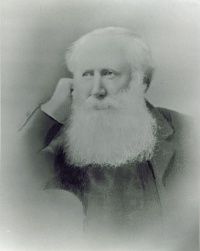James Torpy
From The Orange Wiki
An interesting figure in the life of Orange from the ‘sixties until his demise in June 1903, James Torpy filled many public offices in the district. Coming to Orange following the Forbes gold rush in 1863 he was the host of the Commercial Inn for a number of years.
An Irishman by birth Torpy had received a liberal education which he turned to good account and purchasing the Orange Advocate in 1885 he acted as its leader writer for many years. In the sixties and seventies he contributed many notable contributions to the press, both country and metropolitan.
President of the School of Arts for an uninterrupted period of 20 years, Mr Torpy was credited with being “a well-read man”, and his contributions upon any subject reflected the omnivorous character of his reading. In the fields of mining and agricultural science his knowledge was abundant and gave him an authority in any company.
For a time the subject of this sketch was Mayor of Orange, President of the Orange Jockey Club, President of the old Central Western Rugby Football Union, and in addition President and Vice-president of various other sporting clubs and societies.
In 1889, with the late Hon, Thomas Dalton, Mr Torpy, was elected to Parliament and sat until the dissolution in June 1894, when the single member constituencies being introduced he retired from political life.
A protectionist in politics he was a great advocate for this cause, and the Hansard files contain one speech of several pages which evoked the eulogy of friend and foe alike.
At one period, Sir George Dibbs, when forming a ministry following the defeat of the Parkes administration, offered Torpy the portfolio of Postmaster-General, but he declined.
Enjoying the friendship of many men who were largely in the public life of the country, notably Sir Edmund Barton, Sir George Reid, Sir John See, Sir William Lyne and Sir Henry Parkes, his chivalry was at once evident to all, and it is recounted that on one occasion Sir Henry Parkes, his political opponent, landed in Orange en route to Cudal. No arrangements having been made by Sir Henry’s supporters to welcome him and being left to make Cudal as best he could, James Torpy thereupon harnessed up his horse and buggy and drove the old statesman the 50 miles to complete his business at the centre.
The early period of his life in Australia was spent upon the various goldfields and at Lambing Flat diggings in 1861 he was one of the leaders in the riot against the Chinese invasion of that renowned diggings. At the meeting at Stoney Creek, when the Premier, Charles Cowper, addressed 6000 men, Torpy, then 29 years of age, was one of the outspoken leaders and ran the gauntlet of being gaoled for inciting opposition to the law. He delivered speeches throughout the course of those momentous days when a feeling of uneasiness ran through the State, and his speeches counselling the white population to beware of the injury threatening Australia by the undue influx of Chinese and his advocacy of a 10 pound poll tax earned for him the displeasure of the Sydney Morning Herald, which paper denounced his statements as inflammatory. Strangely enough, Sir Henry Parkes’ paper, the “Empire”, upheld Torpy who was later to see the fixation of a poll tax of 100 pound upon Chinese migrants.
He died of pneumonia on 22 June 1903 at the age of 72 and is buried in the Orange Cemetery.
- Self guided tour of Orange General Cemetery No 2, Early Mayors of the Orange District 1860-1920 (2010) Orange City Council, Orange NSW.

